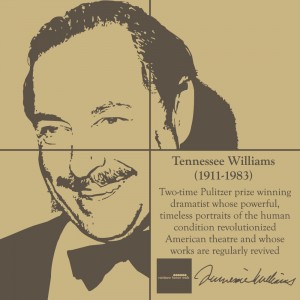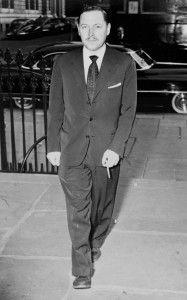 While working as a contract writer for MGM in 1941, Tennessee Williams submitted a screenplay titled The Gentleman Caller. In a classic “Are you kidding?” moment, the studio rejected the script because it did not have a happy ending; it preferred that he write what he termed “a celluloid brassiere” for Lana Turner. Instead, Williams transformed it into the work of art that debuted on stage in Chicago as The Glass Menagerie in 1944. It opened on Broadway in 1945 to glowing reviews, ran 16 months, won the New York Drama Critics’ Circle Award as Best American Play of the year, and revolutionized American theater.
While working as a contract writer for MGM in 1941, Tennessee Williams submitted a screenplay titled The Gentleman Caller. In a classic “Are you kidding?” moment, the studio rejected the script because it did not have a happy ending; it preferred that he write what he termed “a celluloid brassiere” for Lana Turner. Instead, Williams transformed it into the work of art that debuted on stage in Chicago as The Glass Menagerie in 1944. It opened on Broadway in 1945 to glowing reviews, ran 16 months, won the New York Drama Critics’ Circle Award as Best American Play of the year, and revolutionized American theater.
Some have called The Glass Menagerie “the perfect play.” Williams had deliberately set out to create a new kind of “plastic theater” that would replace what he saw as “the stale conventions of theatrical realism.” Instead of attempting to depict real people and experiences on stage, Williams wished to convey their spiritual and emotional truths. His concern was not with the crises and triumphs of extraordinary lives, but with “a dark universe that the innocent persist in calling ‘home sweet home,’” a dream world where self-delusion becomes its own subjective reality. Set in 1937, its characters are alive, if not well, today. They include those who suppress their true selves to be whom others want them to be and who then create a dream world where their fiction becomes their truth.
 By itself, The Glass Menagerie would have given Williams literary immortality, but he followed it in 1947, only two years later, with A Streetcar Named Desire, which many consider to be the greatest play ever written by an American. It too presents characters who are not so much concerned with truth, but with “what ought to be the truth.” Since its Broadway debut, the Pulitzer Prize and New York Drama Critics’ Circle Award winning drama has been produced more than 20,000 times around the world, becoming the most popular American play ever written. A musician version, Oh, Streetcar!, debuted in 1992, with Marge Simpson as Blanche and Ned Flanders as Stanley. It became an opera, which premiered in San Francisco in 1998. In 2014, 67 years after its first performance, a new production at the Young Vic became the fastest fastest selling show in the company’s history. The play has yet to lose its theatrical or emotional power.
By itself, The Glass Menagerie would have given Williams literary immortality, but he followed it in 1947, only two years later, with A Streetcar Named Desire, which many consider to be the greatest play ever written by an American. It too presents characters who are not so much concerned with truth, but with “what ought to be the truth.” Since its Broadway debut, the Pulitzer Prize and New York Drama Critics’ Circle Award winning drama has been produced more than 20,000 times around the world, becoming the most popular American play ever written. A musician version, Oh, Streetcar!, debuted in 1992, with Marge Simpson as Blanche and Ned Flanders as Stanley. It became an opera, which premiered in San Francisco in 1998. In 2014, 67 years after its first performance, a new production at the Young Vic became the fastest fastest selling show in the company’s history. The play has yet to lose its theatrical or emotional power.
After Streetcar, Williams was an unstoppable creative force. A list of the plays he wrote over the next dozen years reads like a catalog of the best American theater of the era: Summer and Smoke (1948); The Rose Tattoo (1951); Cat on a Hot Tin Roof (1955), for which he received his second Pulitzer Prize; Suddenly, Last Summer (1958); Sweet Bird of Youth (1959); Night of the Iguana (1961), which won him yet another New York Drama Critics’ Circle Award as Best American Play of the year; and more.
One of the so-called “literary pink triangle” that also included Gore Vidal and Truman Capote (who hated each other), Williams’ sexual orientation was an open secret. From the beginning of his success, he wrote of the destructiveness of the closet—of every closet—concerning the emotional scarring and lasting damage caused by not being your true self, by trying to be whom others want you to be. His goal, he said, was to air out all of those “closets, attics and basements of human behavior,” which he did continuously. For him, there was no excuse for evasion.
 Homoerotic desire permeated his work and its denial, not its reality, precipitates disaster. By showing the destructiveness of non-acceptance of gays by gay and straight alike, Williams “made an immortal contribution both to the American theater and to the gay imagination.” He was even more frank and forceful in his short stories, where he frequently and specifically addressed the damage faced by homosexuals from the repression of a harsh, uncaring, bigoted society.
Homoerotic desire permeated his work and its denial, not its reality, precipitates disaster. By showing the destructiveness of non-acceptance of gays by gay and straight alike, Williams “made an immortal contribution both to the American theater and to the gay imagination.” He was even more frank and forceful in his short stories, where he frequently and specifically addressed the damage faced by homosexuals from the repression of a harsh, uncaring, bigoted society.
A love for men also suffused his personal life. His most enduring romantic relationship was with Frank Merlo, whom he first met in the late 1940s. It was a time when celebrated gays often hid their homosexuality by appearing in public and going to parties with understanding women. Not Williams. In an especially closeted Hollywood, Vidal observed, “Only Tennessee dared attend these parties with Frank Merlo on his arm.” Merlo became Williams’ personal secretary and provided stability and balance, as well as love and happiness. Although they were no longer together when Merlo died in 1963, Williams went into a deep depression that lasted for the next ten years.
The plays Williams produced after Merlo’s death failed to find an audience at the time of their premieres, but many are now being rediscovered and praised by a new generation. Always he wrote with deep sympathy about the tragedy of “those souls too fragile or frightened or tender or broken to live.” Even when their portrayal required violent imagery, Williams was “a poet of the human heart” who “made pulsating plays out of his visions of a world of terror, confusion, and perverse beauty.” His men and women may be flawed, emotionally unstable, frustrated, and fatally damaged by repressed desire and suppressed emotion, but their feelings as sensitive people “punished by a harsh, uncaring world” touch upon the humanity shared by us all.
Bill Lipsky, Ph.D., author of “Gay and Lesbian San Francisco” (2006), is a member of the Rainbow Honor Walk board of directors.
Recent Comments